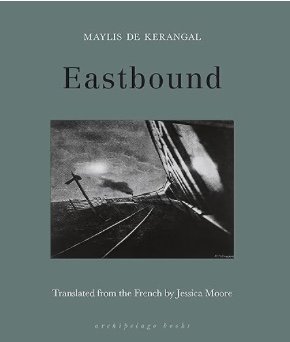Eastbound by Maylis de Kerangal, translated by Jessica Moore (Archipelago Books)
More than a hundred men are crowded into a rail car on the Trans-Siberian Express. They’re conscripts, drafted into the Russian army, the unlucky ones who couldn’t bribe or trick their way out of this grim fate. They have no idea of where they’re headed, other than that they’re in the middle of the “territory of banishment,” a place of “dead bodies under the permafrost,” a region of exile where few ever make their way back home. Siberia is “a world turned inside out like a glove.”
Aliocha was certain he would find a way that would keep him from conscription but he failed and at twenty, he’s certain his life is over. He’s heard of the unspeakable brutality that faces new troops under the guise of hazing; he’s already been beaten up by two of the other conscripts for no reason other than it amused his attackers. As he stares out the train window at the endless miles of forest, he becomes consumed with an urge that is far from a plan: “Run away, defect, jump.”
He has only a cell phone, a charger, and a hundred rubles, which has to be enough to let him vanish into a Siberian city. But when the train stops at the next urban station, Aliocha is surrounded by soldiers with no way to get past that barrier. Back on the train, watching the forest engulf the railway tracks as soon as the cars pass over them, he’s joined by a foreign woman who “smells of flowers and smoke,” and who provides another chance at escape. He grabs it.
Helene is escaping too, from a love affair that curdled when the Russian rebel whom she met in Paris chose to become part of his native country’s bureaucracy, “heir to the Soviet industrial epic.” Perhaps this is why she agrees to help Aliocha, a man she can communicate with only through pantomime and fragments of language. But what begins as a passing whim becomes deadly serious when the sergeant in charge of the conscripts realizes that one of them has vanished.
The search for Aliocha consumes the entire train, from the crowded third class cars that contain the conscripted men to the sanctuary of first class compartments. Everyone, whether they’re attendants or passengers, are drawn into the quest and are forced to choose sides.
Although Eastbound quickly turns into a thriller, a psychological drama played out between two strangers who become so linked that eventually “they have the same faces,” the narrative is filled with moments of unforgettable beauty. Through the windows of a train that’s become a kind of prison, Lake Baikal stretches like “a liquid ribbon…immense and violet.” A lonely city is “two hoops of fire, thrown into a leather sky.” Log houses sprinkled through the dense and bleak forest are graced with carved wooden shutters and lace curtains, brightened with flowers and vegetable gardens, like something from a fairy tale.. The end of the rail line is announced by “a sparkling ethereal horizon,” and at one part of the journey when passengers are given time away from the train, “the silence is so great that each sound explodes.”
Eastbound is a tiny volume, the size that’s usually associated with an appliance’s user manual. It’s only 127 pages, but it contains a mammoth journey, an adventure through cruelty, kindness, and the triumphs of soaring language on a legendary train that travels through the darkest edge of the world.~Janet Brown
